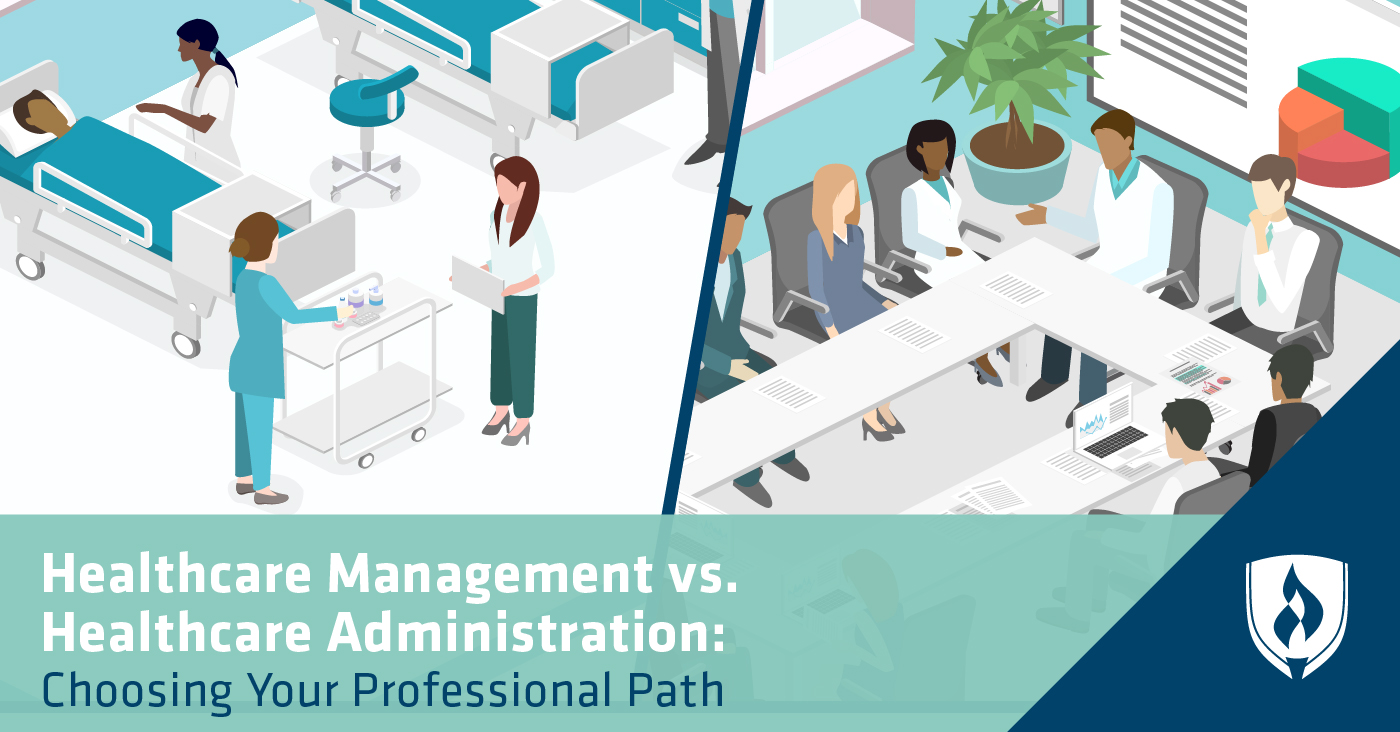Healthcare Management vs. Healthcare Administration: Choosing Your Professional Path
By Hannah Meinke on 01/27/2020

You’ve been thinking about going to college for a while now, and the idea of working more on the “business” side of healthcare certainly sounds appealing. But as you’re starting to weigh your options, you’ve become a little confused by two similar-sounding focus areas: healthcare management and healthcare administration. Is there a distinction between these two disciplines? If there’s a difference, is it significant enough to alter your career options?
We’ve enlisted Rasmussen College adjunct professor Dr. Merle Point-Johnson, a veteran of healthcare administration and management of over 25 years, to help make sense of this sometimes-murky split in academic disciplines. Also check out healthcare administrators skills that you need to lead.
Healthcare Management vs. Healthcare Administration: Does the distinction matter?
This is a challenging question to answer without context. In many cases, the distinction is largely a variation in terminology that would have little bearing on you. For example, it’s unlikely an employer would reject a candidate for obtaining a Bachelor’s degree in Healthcare Management instead of a Bachelor’s degree in Healthcare Administration—there’s likely enough overlap in subject matter to make either a viable option.
Where much of the confusion comes in the context of academics is the inconsistency in what programs are named from school to school. At Rasmussen College, Healthcare Management refers to the undergraduate program, while Healthcare Administration is focused graduate-level coursework. Other schools may choose to flip those labels or use entirely different names for programs that cover similar material.
Instead of focusing on the name of a program, you’re likely better off focusing on the content covered in your courses when making a comparison between programs. Let’s take a glance at the courses found in the Rasmussen College Healthcare Management Bachelor’s degree and Master of Healthcare Administration degree programs.
Healthcare Management Bachelor’s degree courses:
- Healthcare Planning and Policy Management
- Healthcare Operations Management
- Advanced Healthcare Law and Ethics
- Regulation and Compliance in Healthcare
Master of Healthcare Administration degree courses:
- Healthcare Information Systems and Technology
- Healthcare Quality Management
- Healthcare Leadership and Human Resources
- Healthcare Financial Management and Economics
As you can see, there’s certainly overlap. But generally speaking, graduate-level coursework in this area focuses on healthcare at a larger scale. This is to prepare students for navigating senior-level business decisions within a healthcare facility or system that reach beyond their immediate department.
Where Healthcare Management and Healthcare Administration differ
While academic naming conventions have certainly blurred the line between these disciplines, there are still bigger-picture distinctions between the two. Dr. Point-Johnson says administration is the umbrella under which management falls. While there’s overlap in duties and the work being done, they do so at different levels and in different ways that are often tied to the scale of their work. For example, both administrators and managers deal with budgeting. However, admins might allocate money to managers while managers would allocate it to departments.
In a similar way, both admins and managers share the same goal of upholding quality standards in healthcare such as safety, efficiency and timeliness. An administrator may contribute indirectly by supporting those around them, while a manager may do so more directly in a hospital or clinic—which brings us to the biggest distinction between healthcare administration and management.
According to Dr. Point-Johnson, administration is about people, and management is about process. In a senior administration position, you are more likely to be responsible for recruiting, training and supervising staff members while also representing them at investor meetings and governing boards.
What do healthcare administrators and managers do?
As you can see, there’s quite a bit of overlap between the two disciplines. While no single job title will cover the breadth of roles and duties found on the administrative side of healthcare, the Bureau of Labor Statistics’ occupational profile for medical and health services managers can help give you an idea of some common job duties and responsibilities:1
- To plan, direct, and coordinate medical and health services
- Improve efficiency and quality in delivering healthcare services
- Develop departmental goals and objectives
- Ensure that the facility in which they work is up to date on and compliant with laws and regulations
- Manage the finances of the facility, such as patient fees and billing
- Prepare and monitor budgets and spending to ensure departments operate within funding limits
- Keep and organize records of the facility’s services, such as the number of inpatient beds used
Another factor to remember is that many roles in healthcare are determined by the size and type of your employer. In a large hospital, administrators and managers may specialize in just one department such as pediatrics or cardiology. In a small clinic, however, the roles of administrator and manager may be one and the same.
Finding the right route for you
So how do you determine the right educational path if you’re interested in a role similar to a health services manager? You can start by taking a look at what employers are seeking for these roles. Our analysis of over 400,000 job postings for medical and health services management roles found that 67 percent of all job postings were seeking candidates with a bachelor’s degree at a minimum.2 Keep in mind that’s the bare minimum—our analysis also found 37 percent of job postings listed a preference for candidates with a Master’s degree.2
No matter the educational path you choose, Dr. Point-Johnson argues that communication, critical thinking and analysis are crucial to succeed in healthcare. After all, this is not a static business. Pursuing further education, regardless of the degree, will hone your ability to remain as dynamic as the industry itself.
Ready to lead?
The blurred lines between healthcare management and healthcare administration may seem a little confusing at first—but just remember, the overall direction is very similar for both. Much of the distinction will come down to the scale of your preferred career outcome and the education needed to attain that role. If you’re ready to get started, visit either the Rasmussen College Healthcare Management Bachelor’s degree or Master of Healthcare Administration degree pages to learn more.
Check out our articles, What Is a Clinical Director and How Do You Become One? and 8 Reasons to Consider a Career in Health Services Management.
1Bureau of Labor Statistics, U.S. Department of Labor, Occupational Outlook Handbook, [accessed December, 2019] www.bls.gov/ooh/. Information represents national, averaged data for the occupations listed and includes workers at all levels of education and experience. This data does not represent starting salaries. Employment conditions in your area may vary.
2Burning-Glass.com (analysis of 401,929 medical and health services manager job postings, Dec. 1, 2018 - Nov. 30, 2019).




